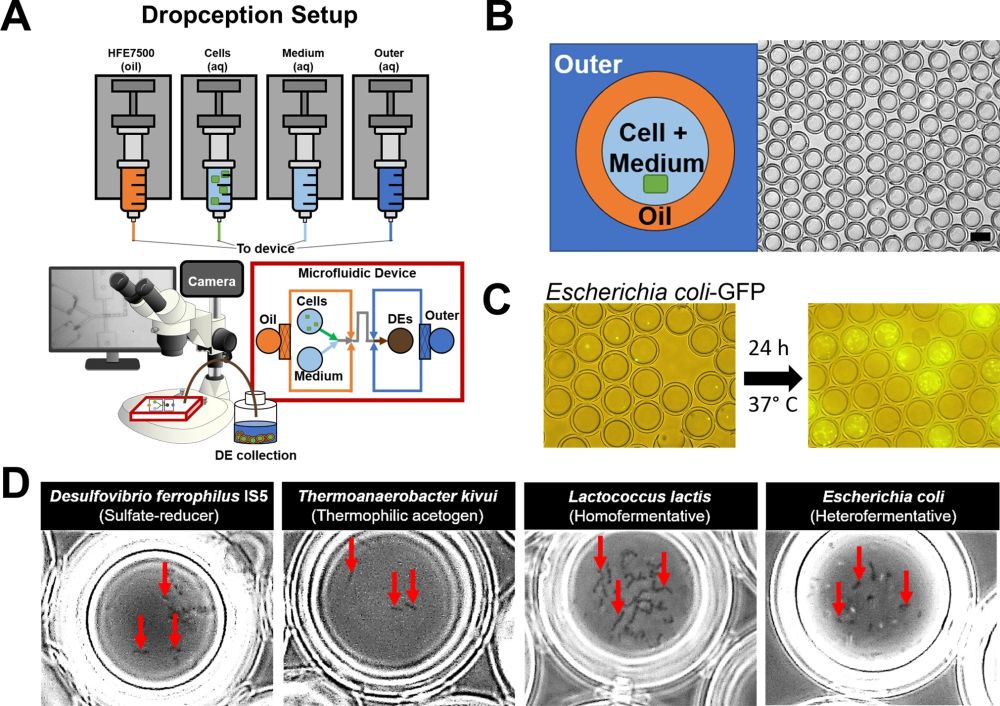
06 Jun Cultivating Microbial Diversity with a Microfluidic Platform: A Breakthrough in High-Throughput Enrichments
Microbes are the unseen powerhouses of our world, playing crucial roles in various ecosystems and human health. Understanding and harnessing their diversity is vital for advancements in fields like biotechnology, medicine, and environmental science. In a groundbreaking study, researchers have developed a microfluidic platform called GrowMiDE platform, a high-throughput droplet-based microfluidic tool for microbial enrichment that opens new doors for cultivating and studying microbial diversity like never before.
The GrowMiDE Platform: Cultivating Microbial Enrichments
The GrowMiDE platform is based on microfluidic technology and allows researchers to encapsulate single microbial cells for parallel high-throughput culturing in discrete microdroplet environments (DEs). The simplicity and efficiency of the platform make it accessible to a wide range of researchers. By creating monodisperse DEs containing different phases (oil, outer, and inner), the microfluidic chip provides a controlled environment for the growth of diverse microbial species. The researchers successfully demonstrated the cultivation of various microbes, including aerobic and anaerobic species, in the GrowMiDE platform.
Unlocking the Potential: Enriching Slower-Growing Microbes
One of the remarkable features of the proposed microfluidic device is its ability to enrich for slower-growing microbes. The nutrient privatization effect within the DEs enables slower-growing species to escape competition from faster-growing ones. Therefore, this microfluidic design allows researchers to selectively promote the growth of slower-growing taxa that are often overshadowed in traditional batch cultures. The platform acts as a valuable tool for studying these species and uncovering their unique physiological characteristics.
“In this study, we developed a high-throughput bacterial enrichment platform based on single cell encapsulation and growth within double emulsions (GrowMiDE). We showed that GrowMiDE can cultivate many different microorganisms and enrich for underrepresented taxa that are never observed in traditional batch enrichments. For example, preventing dominance of the enrichment by fast-growing microbes due to nutrient privatization within the double emulsion droplets allowed cultivation of slower-growing Negativicutes and Methanobacteria from stool samples in rich media enrichment cultures. “, the authors explained.
Discovering Novel Taxa: Unique Enrichments with GrowMiDE
Traditional batch cultures have limitations in uncovering the full extent of microbial diversity within a community. However, the GrowMiDE microfluidic platform has proven to be a game-changer in this regard. By comparing enrichments performed in both batch cultures and GrowMiDE, researchers observed a clear distinction in the microbial community composition. GrowMiDE enrichments unveiled novel taxa that were not observed or enriched in batch cultures using the same media conditions. This ability to selectively promote the growth of specific taxa opens new avenues for exploring and understanding microbial diversity.

“A Schematic representation of the GrowMiDE platform. Four syringe pumps drive oil and aqueous solutions into a custom microfluidic device to encapsulate single microbes within 30 or 45 µm diameter double emulsions (DEs); DE generation is monitored in real-time by a high-speed camera attached to an Amscope stereoscope. B Schematic and representative brightfield image of DE droplets (scale bar = 30 µm). C Merged brightfield and fluorescent images of single E. coli-GFP cells loaded into DEs (left) and after growth in M9 + glucose for 24 h (right). D Brightfield microscopy images indicating growth of diverse anaerobes within DEs including the sulfate-reducer Desulfovibrio ferrophilus IS5 on 60 mM lactate and 30 mM NaSO4, the acetogen Thermoanaerobacter kivui on 50 mM glucose at 65 °C, lactic acid-producing fermenter Lactococcus lactis NZ9000 on 50 mM glucose, and mixed acid fermenter E. coli MG1655 on 50 mM glucose.” Reproduced from McCully, A.L., Loop Yao, M., Brower, K.K. et al. Double emulsions as a high-throughput enrichment and isolation platform for slower-growing microbes. ISME COMMUN. 3, 47 (2023). under Creative Commons Attribution 4.0 International License.
High-Throughput Screening and Isolation: The Power of GrowMiDE + DE-FACS
The compatibility of the GrowMiDE platform with DE-FACS (droplet-based fluorescence-activated cell sorting) further enhances its capabilities. DE-FACS enables high-throughput screening, enrichment, and isolation of microbial cells based on fluorescence signals within the DEs. This functionality holds immense potential for applications such as improved genome recovery, antimicrobial sensitivity assays, and directed evolution studies. By isolating live cells for downstream phenotypic analysis, researchers can gain valuable insights into microbial physiology and function.
Future Directions and Challenges
While the GrowMiDE platform demonstrates tremendous promise, there are still challenges to overcome. For example, the isolation of non-genetically tractable species using DE-FACS is currently limited by the lack of highly fluorescent dyes suitable for fully anaerobic conditions. Nonetheless, advancements in anaerobic fluorescent dyes and custom anaerobic sorting chambers could overcome these limitations, expanding the platform’s applicability.
The GrowMiDE platform represents a significant breakthrough in microbial enrichments, offering researchers a powerful tool to cultivate and study microbial diversity in a high-throughput manner. Its ability to selectively enrich slower-growing species and uncover novel taxa holds great potential for advancing our understanding of microbial communities. Moreover, the platform’s compatibility with DE-FACS enables efficient screening and isolation of microbial cells for further analysis. The future of microbial research is bright with the GrowMiDE platform leading the way towards unlocking the secrets of the microbial world.
“In addition to using GrowMiDE as high-throughput enrichment tool, we are excited about the future prospect of using DE-FACS as a screening tool for undefined aerobic communities. Developing, high-throughput enrichment methods like that do not favor fast-growing microorganisms and are compatible with commonly-available FACS equipment might serve as a novel approach to combat ‘The Great Plate Count Anomaly’ “, the authors explained.
Figures are reproduced from McCully, A.L., Loop Yao, M., Brower, K.K. et al. Double emulsions as a high-throughput enrichment and isolation platform for slower-growing microbes. ISME COMMUN. 3, 47 (2023). https://doi.org/10.1038/s43705-023-00241-9 under Creative Commons Attribution 4.0 International License.
Read the original article: Double emulsions as a high-throughput enrichment and isolation platform for slower-growing microbes


